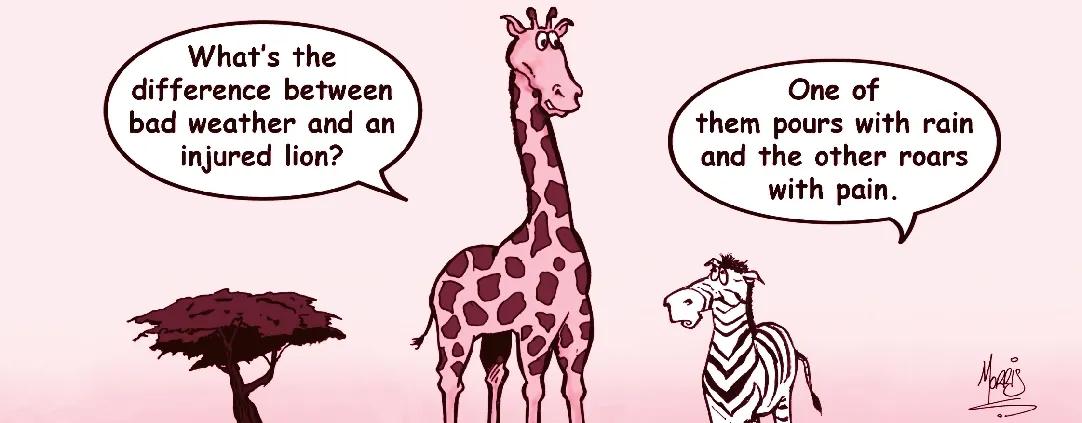互换字母乐趣大
2017-07-31ByMarshaHenderson
⊙ By Marsha Henderson
互换字母乐趣大
⊙ By Marsha Henderson
Exchanging Letters


看视频、练发音,扫码获取更多British Council提供的免费学习资源
Exchanging letters: a type of joke in which the first letters of similar sounding words in the answer are exchanged.
A Good Old British Joke一个绝妙的古老英国笑话
As you know, the British love wordplay, and there are many jokes beginning with the question, “What’s the difference?” between two completely different things. The answers sound almost the same, but we exchange the first letters.
What’s the difference between a tired teacher and an angry dog?
One of them marks badly, while the other barks madly.
When Someone Famously Makes Mistakes…如果有人犯了错而成了著名事件……
A spoonerism[首音互换], in which the speaker exchanges the first letters of two words, is very similar. Sometimes, they’re funny mistakes and sometimes made on purpose. You might say that everything an untruthful person says is just a lack of pies—a pack of lies.
Spoonerisms got their name from William Archibald Spooner (1844–1930), of Oxford University, who made these mistakes a lot. One of his most famous is “Three cheers for our queer old dean!” He was talking about Queen Victoria, not a respected member of the university staff!
A Famous British Character一个有名的英国角色
Another type of wordplay is called a malapropism[可笑的用词错误]. A malapropism is a funny mistake made when the speaker uses one word instead of another which sounds similar, e.g. “He’s a wolf in cheap clothing!’(He’s a wolf in sheep’s clothing.) It’s named after a character called Mrs. Malapropfrom Richard Sheridan’s play, The Rivals (1775), but her name comes from the French mal à propos, which means “badly put.”
When Someone Famous Makes Mistakes…如果一个名人犯了错……
A fairly recent type of letter changing mistake is the bushism[布什话语]—named after the former American president, George W. Bush. It’s like a modern malapropism, so you can mix up any words, syllables or letters in a funny way. Bush famously said that when somebody wrote his government’s history, it would be done in an authoritarian[专制的]way. He meant it would be done in an authoritative[权威的]way.
When Ordinary People Make Mistakes如果普通人犯了错
People laugh at Bush, but he’s not unusual in making these kinds of mistakes. We all do it, all the time, and if you laugh when you do it, listeners will think it’s a clever joke, not a mistake.
Activity 1
Choose the best answer according to the text.
1. The answers to “What’s the difference?”
jokes sound…
a. unlike each other.
b. quite similar to each other.
c. very similar to each other.
2. Spoonerisms are…
a. sometimes mistakes.
b. always mistakes.
c. often written in joke books.
3. Spoonerisms were named after…
a. the mental activity of “spooning” letters from word to word.
b. a man who wrote a lot of these jokes.
c. a man who made a lot of these mistakes.
4. Malapropisms can change…
a. syllables and first letters.
b. syllables and words.
c. first letters only.
5. Bushisms are…
a. similar to “What’s the difference?” jokes, spoonerisms, and malapropisms.
b. similar to spoonerisms and malapropisms.
c. a completely new type of mistake.
Activity 2
Change the adjectives[形容词]into adverbs and adverbial phrases to answer the questions.
Examples:
How does the teacher mark? (bad)—badly
How did the president mix up his words? (funny)—in a funny way
How’s he going to cut that paper? (straight)—straight
1. How are you feeling now? (very good)
2. How does her family usually eat? (healthy)
3. How did the shop assistant smile at me? (very silly)
4. How did the president give his speech? (fast)
5. How often do you read the newspaper?
(daily)
Answers Activity 1
1. c; 2. a; 3. c; 4. b; 5. b Activity 2
1. very well; 2. healthily; 3. in a very silly way; 4. fast; 5. daily
